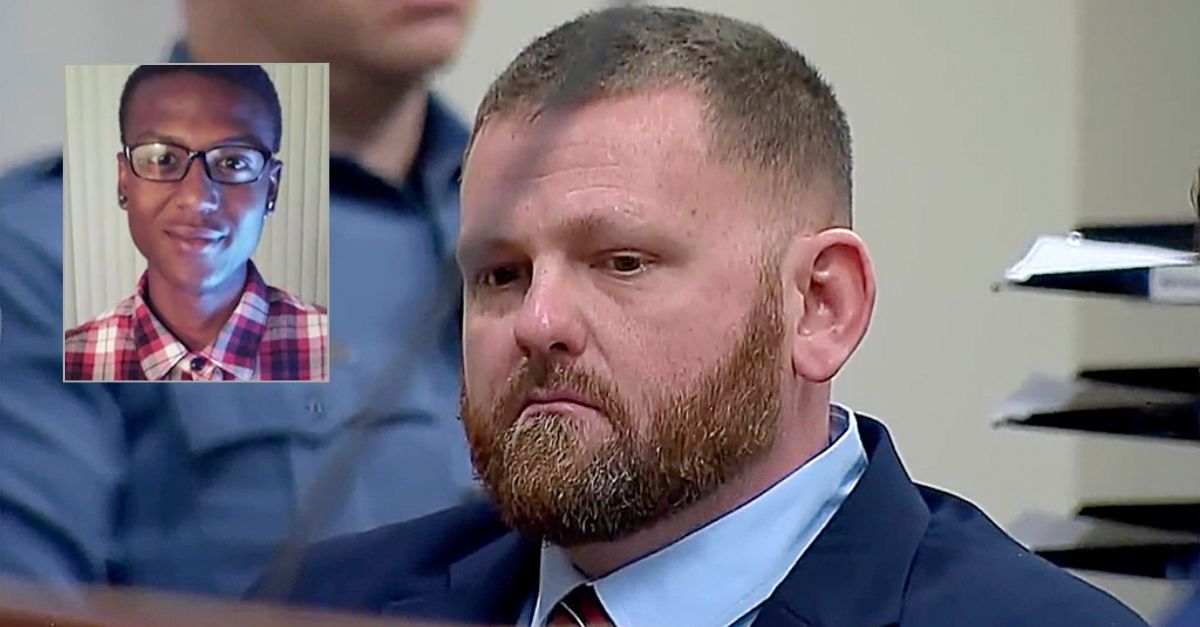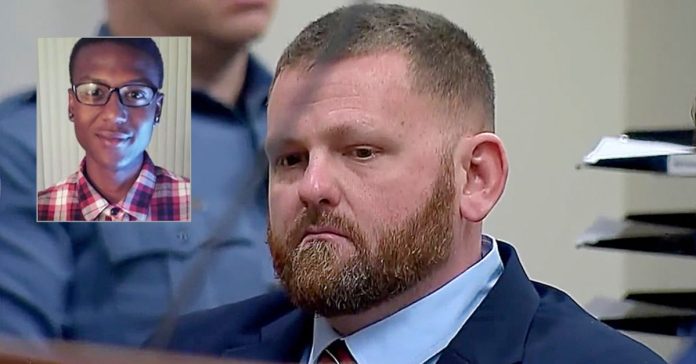
Colorado ex-police officer Randy Roedema listens during sentencing at the Adams County Court, Friday, Jan. 5, 2024, in Brighton, Colorado. Roedema was convicted of killing Elijah McClain, a young Black man walking home from a store. (ABC News One/Pool via AP; McClain’s photo Law&Crime file)
Former Colorado Officer Randy Roedema learned his fate in the death of Elijah McClain, killed at the hands of police as he walked home from a store when officers responding to a 911 call of someone wearing a ski mask and “acting strangely” in Colorado in 2019 confronted him.
Roedema was sentenced to 14 months in jail after he was found guilty in October of criminally negligent homicide and third-degree assault.
McClain’s mother called the officer a “bully with a badge,” The Associated Press reported.
“Randy Roedema stole my son’s life,” she said, the AP reported. “All the belated apologies in the world can’t remove my son’s blood from Randy Roedema’s hands.”
Roedema addressed the family, the wire service reported.
“I want the McClain family to know the sadness I feel about Elijah being gone. He was young,” Roedema said. “We all responded to that incident in a way that we were all trained to do. Needless to say, the situation had a horrible outcome that nobody intended or wanted to happen.”
His sister Kayleine Roedema said glowing words about him.
“It hurts me because I know him, and I know better,” she said, the AP reported. “He’s a loving husband and father, son and brother, cousin and friend. It’s so hard for me to imagine how it could be beneficial for him to serve time in jail.”
His attorney said he would appeal.
McClain, 23, died days after a confrontation with police responding to a 911 call of someone wearing a ski mask and “acting strangely” on a street in Colorado in 2019, Law&Crime reported in October.
A second officer, Jason Rosenblatt, was acquitted of all charges.
In court to hear the verdict, McClain’s mother, Sheneen McClain, held her right hand in a fist as she left the courtroom, the wire service reported.
Prosecutors argued the defendants used excessive force and disregarded signs McClain was in medical distress.
The officers’ defense attorneys countered their clients used “reasonable and efficient force” and that McClain died from a ketamine overdose given by paramedics, Denver’s ABC affiliate KMGH-TV reported.
An indictment spells out how McClain died and what led up to the death on Aug. 24, 2019, as the young man walked home from a convenience store.
A driver spotted McClain — wearing a black mask and a jacket — and called 911.
Roedema, Rosenblatt and a third officer, Nathan Woodyard, responded to a dispatch call for service to the area. Woodyard, the first to arrive, ordered McClain to stop. Woodyard did not see McClain with any weapons but noted a grocery bag he thought was “suspicious.”
Rosenblatt arrived next and joined Woodyard, and the stop quickly turned physical. The officers grabbed McClain’s arms, moved him to a grassy area and pushed him up against an apartment building wall.
Roedema grabbed the grocery bag — containing cans of iced tea — from McClain’s hands and threw it to the ground. McClain struggled as the officers tried to restrain him.
While McClain was up against the wall, Roedema told the other officers McClain had reached for “your gun,” but whose was unclear. The AP reported that Roedema later said Rosenblatt’s gun was the target.
Prosecutors told jurors to be skeptical, saying Rosenblatt said he could not feel anyone reaching for his gun.
Roedema’s lawyer, Don Sisson, said the officers acted in the moment to protect themselves after he claimed McClain said, “I intend to take my power back,” the wire service reported.
Rosenblatt applied an unsuccessful carotid control hold to McClain, and Woodyard used a carotid control hold. McClain went unconscious and snored.
Roedema put McClain in a “bar hammer lock,” when officers hold a person’s arm behind their back to gain control. Roedema said he “cranked pretty hard” on McClain’s shoulder and heard it pop three times.
Once McClain lost consciousness, Woodyard released the carotid control hold, and Rosenblatt radioed for Aurora Fire Rescue to respond. Just then, McClain regained consciousness, and the struggle resumed.
Woodyard reported McClain started to “twist and pull away” while on the ground. The three officers wrestled McClain to the ground. Roedema tried to maintain control of McClain by putting his body on him to “sprawl him out.”
The officers said McClain exhibited “extraordinary strength.” The officers cuffed McClain and continued to restrain him. They remained on top of him and held him on the ground despite pleas that he could not breathe.
Woodyard rolled McClain onto his side into the “recovery position.” McClain vomited multiple times into his mask during the struggle.
Additional officers arrived. No one checked McClain’s pulse or monitored his airway, breathing, or circulation.
McClain said his name, said he could not breathe and that what the officers were doing “really hurt.” McClain reported he did not have a gun, asked for help, and asked to find his phone.
Roedema increased pressure on McClain while restraining him, causing him to cry out, “Ah, ow, okay, okay.”
Roedema responded, “Well, chill out! You’ve already been told several times to stop.”
When McClain spoke again, Roedema picked up McClain’s torso and forcibly pushed it to the ground, causing McClain to cry out, “Ow!”
Roedema ignored McClain’s repeated statements, saying he could not breathe. When other officers told Roedema to make sure McClain could breathe, the officer dismissed them, the indictment said.
Aurora Fire Rescue Paramedics Jeremy Cooper injected 500 mg of ketamine, a sedative, into McClain’s right deltoid as he was handcuffed on the ground — a dosage for a patient who weighed 77 pounds more than McClain. His correct dosage for his weight, had it been warranted, would have been 325 mg, the indictment said.
On the gurney, McClain appeared unconscious, had no muscle tone, was limp, and had “visible vomit from his nose and mouth.”
In the ambulance, McClain had no pulse and was not breathing. Paramedics performed CPR, intubated him, and gave him a shot of epinephrine. At the hospital, McClain regained a pulse but never regained consciousness. He suffered a hypoxic-ischemic event, hypoxia, hypoxemia, aspiration, metabolic acidosis, lacerations, abrasions, and bruising.
He was declared brain dead on Aug. 27, 2019. His family removed him from life support days later.
An emergency room doctor who reviewed police body-worn camera footage of the incident said the paramedics inaccurately diagnosed McClain at the scene and said ketamine should never have been administered, the indictment said.
Woodyard was acquitted. Cooper and Paramedic Peter Cichuniec were convicted last month, the AP reported.
McClain’s family sued for wrongful death and won a $15 million settlement. His death sparked nationwide protests over racial injustice.
Law&Crime’s Marisa Sarnoff contributed to this report.
Have a tip we should know? [email protected]

